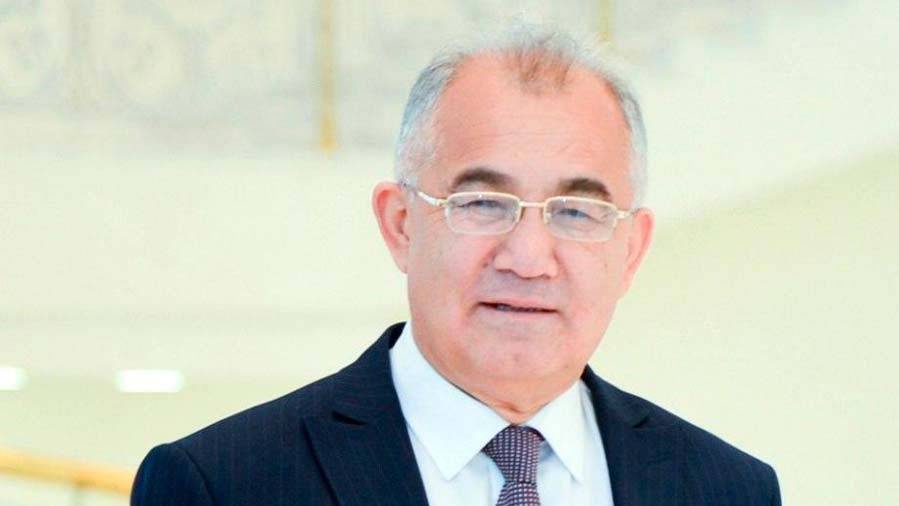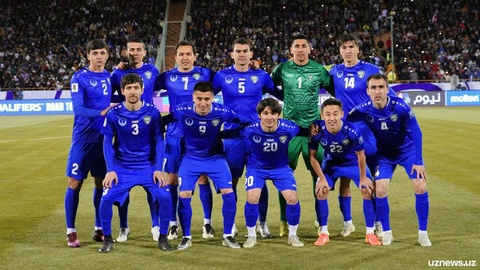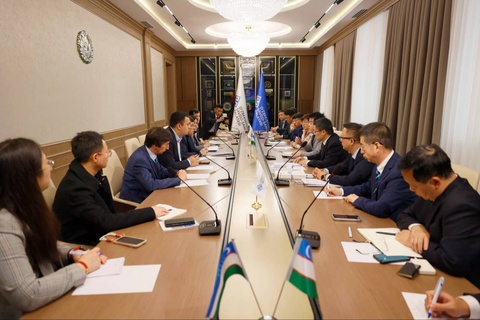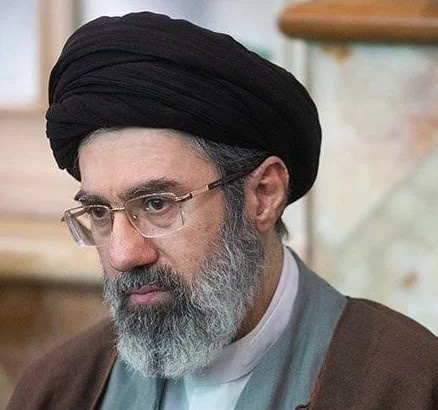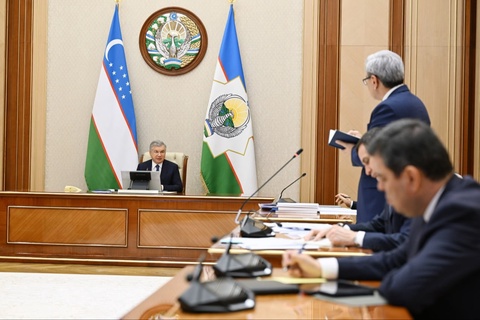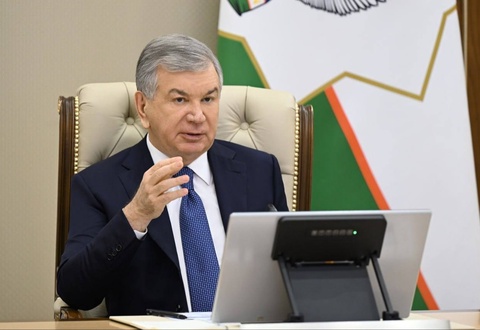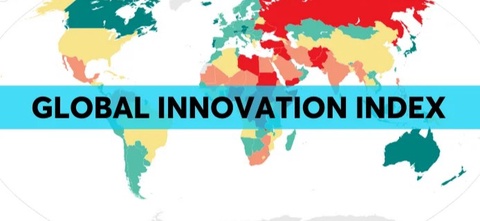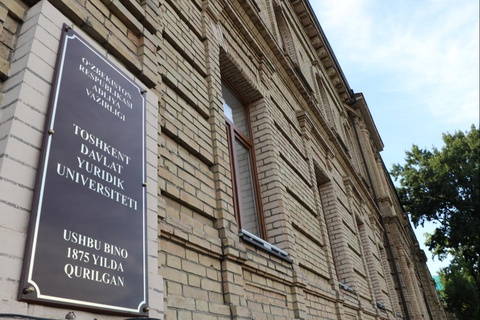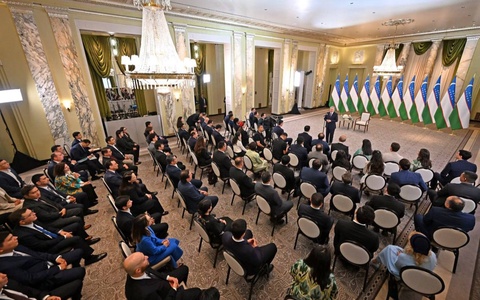Exactly one year ago - on November 6, 2021 - a solemn ceremony of inauguration of the newly elected President of the Republic of Uzbekistan Sh.M. Mirziyoyev was held at a joint meeting of the chambers of the Oliy Majlis. In his inaugural speech, he briefly summed up the results of democratic reforms in our country in 2016-2021 as part of the Action Strategy in five priority areas of development.
The head of state also outlined seven priority areas and tasks for the next five years, indicated in his first fundamental author's book "Strategy of New Uzbekistan" and serving to achieve the great nationwide goal - building New Uzbekistan, forming the foundation of a new Renaissance - the third Renaissance. “Deeply realizing the responsibility for today and tomorrow of our Motherland, I want to assure you: we will continue the democratic reforms that we started together with our people even more firmly and resolutely, and we will never deviate from this path! Together we will definitely build New Uzbekistan!” the President emphasized.
From Action Strategy to Development Strategy
The main idea put forward in the Development Strategy of New Uzbekistan for 2022-2026 in terms of ensuring consistency and continuity of transformations is the implementation of the principle "From the Action Strategy to the Development Strategy". Moreover, the Development Strategy, which marked the beginning of a new stage of our national development, defines dignity, rights and freedoms, the legitimate interests of a person, the introduction of a new development paradigm - the principle "man - society - state" as the highest value.
As the main criterion and leitmotif of the activities of all branches of state power - from the President, senators, deputies, members of the Cabinet of Ministers, judges of all levels to representatives of the lowest level of state bodies - he outlined the strict implementation of the requirements of the Constitution and laws of the country, the full implementation of priority principle "In the name of the honor and dignity of human being".
At the same time, “human dignity” for New Uzbekistan, as defined by the President, is, first of all, ensuring a peaceful and safe life for every citizen, his constitutional rights and freedoms, creating decent living conditions and modern infrastructure, qualified medical care, quality education, targeted social protection and a healthy ecological environment for every inhabitant of the country.
Without going into details, let us recall that, summarizing the characteristics of the “New Uzbekistan” outlined by the President, we can define it as a people’s, social, humane, democratic and legal state, in which the basic principles are also implemented: “It is not the people that serve state bodies, but state bodies must serve the people”, “Leaders must serve not only the state, but above all the individual and his family, ensuring their legitimate interests”, justice and the rule of law, the priority of private property, and the development of the national economy. New Uzbekistan is a state with high human capital and intellectual potential. New Uzbekistan is an open and fair civil society, an enlightened society.
Today, humanity is going through an extremely difficult period in its history - it is facing new, previously unknown threats and challenges, an increase in confrontation and conflicts between various forces, an intensification of a merciless struggle for resources, and is entering an era of globalization and fierce competition. With this in mind, the head of state outlined urgent, extremely important and urgent tasks to ensure peace and security on a global and regional scale. He put forward a decisive principle - "We must be open to the world, and the world must be open to us", which today is confidently turning into the rule of our life.
The President also drew attention to the proposals of the population, put forward during the pre-election meetings of all candidates with representatives of the electorate, on the implementation of a constitutional reform in the country and instructed the elected representatives of the people (senators and deputies), having studied the world experience of constitutional construction, to carefully consider the issue of improving the Basic Law, which determines current and future development of the country. Anticipating, we note that later, in a festive congratulation to the people of Uzbekistan in connection with the 29th anniversary of the adoption of the Constitution of the Republic of Uzbekistan and in the second edition of his book "Strategy of New Uzbekistan", the head of state outlined the priority areas of constitutional reform, demanded by life itself and dictated by the logic of democratic transformations.
It should be emphasized that today the rapidly developing life, the philosophy of reforms, based on the saying of our great ancestor, the thinker Bahouddin Nakshband: “He who loses time, loses life itself”, require not to slow down the pace of reforms, but on the contrary, to go only forward, rationally use each day and hour to achieve the goals of democratic reforms, improve the level and quality of life, welfare and well-being of the population.
However, it is impossible to grasp the immensity and, of course, within the framework of one article it is impossible to cover and designate all the great achievements and successes of the ongoing democratic reforms. Therefore, here we will limit ourselves to only individual touches on the pragmatic and balanced, active and proactive foreign policy and economic diplomacy of New Uzbekistan.
New Uzbekistan: foreign policy and foreign economic diplomacy
The priorities of Uzbekistan in this area, defined in the Development Strategy, are:
- Strengthening good neighborly relations and strategic partnership, primarily with the countries of Central Asia;
- providing all possible assistance in restoring peace and stability in Afghanistan, preventing an economic and humanitarian crisis in that country, and implementing major interregional transport and communication projects;
- expansion of mutually beneficial and multifaceted relations with our partners in all regions of the world, as well as filling with new practical content relations with the UN and its specialized structures, the Inter-Parliamentary Union, international financial institutions and regional organizations, including the CIS, SCO, OIC, UTC, ECO.
From the very beginning, we emphasize the enormous efforts and personal role of the head of state in the development and implementation of an active foreign policy and foreign economic policy of Uzbekistan as an equal subject of international relations, in strengthening the position of our country in almost all major international organizations. To prove this, we will cite only two facts that in just a year the President of Uzbekistan Sh.M. Mirziyoyev, firstly, made 18 visits to the states of Central Asia, China, the United Arab Emirates, Saudi Arabia, Pakistan, Turkey, South Korea, Hungary and other countries. In turn, 17 official visits of heads of foreign states, 38 visits of high-ranking officials of foreign countries and international organizations to Uzbekistan were organized (73 visits in total). This gave dynamism and intensity to the development of relations with foreign countries and international organizations. Secondly, only in meetings in the format of the UN, OSCE, SCO, CIS and Central Asia put forward more than 30 important initiatives to resolve topical and topical problems of the global and regional agenda.
These initiatives cover, in particular, such areas as the peaceful settlement of the situation in Afghanistan, combating the negative consequences of the global crisis during the coronavirus pandemic, climate change and improving the environmental situation, protecting the rights of youth and women, removing economic barriers, developing digital technologies, transfer innovation, poverty eradication, food security, preservation of cultural and historical heritage, tourism development, sustainable development. Moreover, the initiatives of the President of Uzbekistan are deeply thought out, aimed at solving life problems, designed to improve the political, economic, socio-cultural and environmental situation in the world and various regions. That is why they receive the full support of the heads of state of the world and international organizations.
Strengthening good neighborly relations and strategic partnership in Central Asia
President Sh.M. Mirziyoyev identified the expansion and strengthening of multifaceted and mutually beneficial good-neighbourly relations with the countries of Central Asia, ensuring sustainable development, peace and stability in the region, solving key problems of regional security, including resolving the situation in Afghanistan, strengthening cooperation with regional and world powers, international organizations in this direction.
Thanks to the open and good-neighborly policy of Tashkent, today the countries of Central Asia for the first time began to discuss topical regional issues so openly and sincerely. A new term “Central Asian Spirit” has appeared in the political vocabulary of the world, reflecting the qualitatively new political atmosphere of cooperation and mutual understanding created in the region, demonstrating the optimistic attitude of the leaders of our countries to play a paramount and key role in solving the most pressing problems of the region, which hinder the disclosure of its rich economic and human potential. , based on the principles of good neighborliness, mutual trust, equality, respect and consideration of mutual interests.
Constant and direct contacts between heads of state are of key importance for strengthening regional cooperation. The President of Uzbekistan has paid an official visit to Kazakhstan, Kyrgyzstan and Turkmenistan since December 2021. At the same time, leaders of Tajikistan and Turkmenistan paid state visits to Tashkent this year.
And this is not counting the meeting of the heads of state within the framework of the Samarkand SCO summit, the first meeting in the "Central Asia - European Union", "India - Central Asia" format, various formats and platforms created within the framework of the CIS, SCO, UTC and other international structures. Moreover, Uzbekistan has significantly updated and modernized the base of bilateral relations with all the states of the region.
It should be noted that the trade turnover between Uzbekistan and the states of Central Asia is steadily growing. For example, at the end of 2021, with Kazakhstan it amounted to $4.3 billion. With Turkmenistan, as well as Kyrgyzstan, approached a billion dollars.
The annual Consultative Meetings of the Heads of State of Central Asia, initiated by President Sh.M. Mirziyoyev, have become an important factor in deepening regional cooperation, an effective platform for confidential and constructive discussion and coordinated solution of common problems of the countries of Central Asia. The Head of State took part in the work of the Fourth Consultation Meeting in Kyrgyzstan, which can be regarded as an event of historical significance. As a result of the meeting, important documents were signed in terms of the development and institutionalization of multifaceted cooperation:
- Treaty of Friendship, Good Neighborliness and Cooperation for the Development of Central Asia in the 21st century;
- The concept of interaction between the states of Central Asia within the framework of multilateral formats;
- Central Asian regional program "Green Agenda";
- "Roadmap" for the development of regional cooperation for 2022-2024.
Uzbekistan - UN: a qualitatively new stage of cooperation
Today, the world community considers New Uzbekistan as a stable and dynamically developing state of democratic transformations, a country of great opportunities and practical deeds. Thus, UN Secretary-General António Guterres stated that “Under the leadership of the President of Uzbekistan, the country is contributing to international efforts related to climate change, environmental protection and regional interconnectedness, while carrying out a significant reform process. Uzbekistan, as a member of the UN Human Rights Council, has taken on a special obligation to promote and protect human rights. The UN will continue to count on the Republic of Uzbekistan to promote the values and principles enshrined in the UN Charter.”
Over the past period, the President of Uzbekistan held meetings with such high-ranking representatives of the UN as First Deputy Secretary-General of the UN Amina Mohammed, Special Rapporteur on the promotion and protection of human rights and fundamental freedoms in the context of the fight against terrorism Fionnuala Ni Aoline, Deputy Secretary-General of the UN - Head of the Counter-Terrorism Vladimir Voronkov, UN Under-Secretary-General - UNODC Executive Secretary Geda Wali.
- Mohammed, in particular, emphasized that "UN highly appreciates the ongoing open and pragmatic policy, as well as the program of fundamental reforms to build the New Uzbekistan, which are fully consistent with the main tasks of the Global Agenda for Sustainable Development until 2030."
She highly appreciated the cooperation of Uzbekistan with all UN structures. Thus, today more than 200 projects in various areas are being jointly implemented.
Firstly, in 2018-2021, at the initiative of the President of Uzbekistan, five important special resolutions of the UN General Assembly were adopted aimed at strengthening regional and international cooperation in order to ensure peace, stability and sustainable development in the Central Asian region, promoting tolerance, non-discrimination and respect for the rights rights based on the implementation of the principle of “Enlightenment against ignorance”, protection and promotion of the rights of young people, support for sustainable tourism and sustainable development of our region, the transformation of the Aral Sea region into a zone of environmental innovation and technology, the creation of the UN Multi-Partner Trust Fund for Human Security for the Aral Sea region in Uzbekistan.
Secondly, in 2022 alone, six documents prepared by the Uzbek side are distributed as UN documents. These are, in particular, the Bukhara Declaration of the international forum "Dialogue of Declarations", the Tashkent Declaration of the international conference dedicated to the tenth anniversary of the joint implementation of the UN Global Counter-Terrorism Strategy in Central Asia, on the creation of an International Multifunctional Transport and Logistics Hub for Humanitarian Aid, documents of the Samarkand SCO Summit on dialogue and cooperation in an interconnected world, as well as solidarity for the sake of common security and prosperity.
Thirdly, also at the initiative of Uzbekistan, supported by 40 countries, at the 76th session of the UN General Assembly, the resolution “Strengthening interconnectedness between Central and South Asia” was adopted. In particular, it recommends:
- continue and develop cooperation between Central and South Asia by expanding the infrastructure of transport and information and communication technologies and the formation of new international transport corridors that provide convenient, sustainable, commercially viable, low-cost, accessible, inclusive and safe routes to seaports;
- take into account the importance of Afghanistan's potential role in establishing links between Central and South Asia, as well as its economic development and integration into interregional economic processes to ensure lasting peace and stability;
- Consider the importance of intermodal transport for links between Central and South Asia and, in this context, increase infrastructure compatibility to improve air, land and sea links between countries.
Fourthly, the UN Office on Drugs and Crime signed in Tashkent with the ministries of foreign affairs of the states of the region a new Cooperation Program in Central Asia for 2022-2025 with a budget of $90 million, covering such areas of cooperation as the fight against transnational organized crime and terrorism, treatment of drug use disorders; and HIV/AIDS prevention.
Today, the UN General Assembly is considering the resolution “Increasing the role of parliaments in achieving the Sustainable Development Goals and ensuring human rights”, initiated by the President of Uzbekistan.
Of course, all this is a great success of Sh.M. Mirziyoyev, who is recognized as the most proactive and productive head of a UN member state. Not a single president of a country in the world has yet managed to achieve such results - the adoption of 11 documents initiated by him by the UN within just five years.
Dynamic development of relations with the Inter-Parliamentary Union
Tashkent hosted the 14th Summit of Women Heads of Parliaments of the IPU Member States “Parliamentary Leadership: Anticipating Risks to Better Ensure Sustainability and Prosperity”. It was attended by 17 women speakers, 120 representatives of women parliamentarians from more than 20 states, representatives of the IPU, the UN, the OSCE Parliamentary Assembly, the CIS Inter-Parliamentary Assembly.
The purpose of the summit was to identify priority areas and actions for parliaments to ensure gender equality and the empowerment of women and girls, as well as effective sustainable development and prosperity of states.
The participants got acquainted in detail with the experience of Uzbekistan in ensuring the rights and freedoms of women in the framework of the implementation of the 2030 Agenda for Sustainable Development, which was distributed among the UN member states as an official document of the 75th session of the UN General Assembly. At the same time, representatives of the UN and the IPU stressed that the trends observed in Uzbekistan in this area are in line with global processes of expanding the representation of women at the highest levels of government, eliminating gender inequality, increasing their number in parliament, government and the judiciary. In particular, it was positively assessed that Uzbekistan, where the number of women in parliament exceeded 33 percent, occupies 55th place (out of 190) in the world ranking of states (the world average reaches 26 percent).
The President of the IPU Duarte Pacheco, who took part in the work of this summit, with whom the President of Uzbekistan Sh.M. Mirziyoyev met, described the head of our state as “a leader of the nation with unique abilities, a strong, prominent and influential political leader in Central Asia. It is especially important that he stands for a strong and effective parliament, his policy of increasing the role of parliament is an example for other countries.”
Secretary General of the IPU Martin Chungong noted that the IPU fully supports the important initiative of the President of Uzbekistan on the adoption of the UN General Assembly resolution "Increasing the role of parliaments in achieving the Sustainable Development Goals and ensuring human rights." According to the leadership of the IPU, when choosing the venues for this summit, the successes of the gender policy of Uzbekistan, as well as the policy of sustainable development, the inclusion of global SDGs in national development strategies and programs were taken into account.
The summit adopted the Tashkent Declaration, aimed at supporting the formation of gender-sensitive parliaments, increasing the role of parliaments in the development of gender legislation, eliminating violence against women and girls, as well as ensuring the sustainable development of society, achieving the global UN Sustainable Development Goals.
At the same time, this declaration and information on the gender policy of our country were distributed as official documents of the 145th Assembly of the IPU, which was held in October this year in the city of Kigali (Rwanda).
"Samarkand Spirit" of the Shanghai Cooperation Organization
According to the head of our state, the chairmanship of Uzbekistan in the SCO in 2021-2022 fell on a dynamic period, very full of various events and trends - a period of “historical break”, when one era ends and another, still unpredictable and unknown, begins. Nevertheless, under the direct leadership and control of the President, over 80 events were held in all areas of SCO cooperation, which is highly appreciated by the world community.
The summit of the organization was held in September this year in the city of Samarkand, since ancient times recognized as a storehouse of ideas and knowledge. Here a common goal was forged - to live better, be more successful and become happier. At the summit, it was emphasized that this fact itself initially gave a certain "new Samarkand spirit" to cooperation within the SCO, the implementation of the organization's slogan "The SCO is strong if each of us is strong." For the successful development of each member state will steadily contribute to the sustainable development of all partners and ultimately serve as the basis for the prosperity of the common space of the SCO.
As SCO Secretary General Zhang Ming noted, the Memorandum on Iran's commitment to become a full member of the SCO, adopted in Samarkand, will significantly strengthen the group of countries - members of the Shanghai Cooperation Organization. Iran's position as a strong and stable country in the region is important for the SCO.
Iranian Foreign Minister Hussein Amir Abdullahian said that from now on we have entered a new stage of economic, trade, transit and energy cooperation. The “Samarkand Spirit” is intended to organically complement the very “Shanghai Spirit” (of mutual trust, mutual benefit, equality, mutual consultations, respect for the diversity of cultures, striving for joint development), created 20 years ago in the SCO Charter, which laid the foundation for a close, fruitful and multifaceted cooperation between the SCO member states.
The summit is recognized as one of the most important events in the life of not only the SCO, but also the “big SCO family”. For the first time in three years, the heads of 14 states met face to face in Samarkand, where a record 44 documents were signed, including the Samarkand Declaration. In it, the heads of state highly appreciated the results of our country's chairmanship in the SCO, which contributed to the further development of multifaceted mutually beneficial cooperation. They, in particular, welcomed the Samarkand initiative of solidarity for the sake of common security and prosperity, put forward by Sh.M. Mirziyoyev, aimed at ensuring peace and stability, broad international cooperation and promoting the sustainable development of mankind, as well as a number of his other international initiatives within the framework of the SCO and the UN .
Under the chairmanship of Sh.M. Mirziyoyev, the leaders of the SCO member states for the first time also adopted statements by the SCO Council of Heads of State in the following areas of both regional and global significance.
First, action to respond to climate change. Here the importance of cooperation in the field of environmental protection is noted; the importance of ensuring access to a source of safe drinking water, basic sanitation and healthy hygiene; the inadmissibility of using the climate agenda to introduce measures that limit trade and investment cooperation. The importance of further development of interaction with the UN, interested states and structures in solving the problems of the Aral Sea basin in connection with the large-scale problems of its drying up was emphasized.
Secondly, ensuring reliable, sustainable and diversified supply chains. The desire of states to ensure sustainability, reliability and stability of international supply chains was confirmed; maintaining openness and transparency of cooperation; deepening cooperation in various sectors, increasing mutual trade between the SCO member states, supporting micro, small and medium-sized businesses in the SCO member states, strengthening cooperation in the field of high-tech production and with a high level of processing of finished products, providing favorable conditions for access to modern technologies , as well as to expand investment cooperation in the field of digital and "green" economy, sustainable development.
Third, ensuring global food security. It was emphasized that food security affects the foundations of the existence of mankind and the healthy functioning of the world economy, is one of the goals under the UN Agenda for Sustainable Development for the period up to 2030 and an important basis for ensuring economic development, social stability and national security. The need was expressed to step up efforts to improve technologies for sustainable production and cultivation of agricultural products, as well as in the field of improving soil quality, improving land use and soil management, protecting plants from pests and diseases, introducing modern and innovative agricultural technologies, and more.
Fourth, ensuring energy security. The need was emphasized to increase mutually beneficial cooperation in the energy sector, including the efficient use of all types of energy resources, the use of effective economically and environmentally friendly technologies that reduce the negative impact on the environment and contribute to energy security and the transition to cleaner and more environmentally friendly energy sources in an energy efficient economy and other areas.
In addition, the heads of the SCO states supported the efforts and initiatives of Uzbekistan in the field of:
- Creation in Central Asia under the auspices of the UN of the Regional Center for the Development of Transport and Communication Interconnection;
- development of cooperation in the field of industry and production cooperation within the framework of the SCO, stimulation of industrial cooperation between the business circles of the SCO member states and the opening of the industrial zone "Uzbekistan - SCO";
- further development of cooperation with the UN, interested states and structures in solving the problems of the Aral Sea basin in connection with the large-scale problems of its drying up, including within the framework of the implementation of the provisions adopted at the initiative of Uzbekistan of the resolution of the UN General Assembly on declaring the Aral Sea region a zone of environmental technologies and innovations, UN Multi-Partner Trust Fund for Human Security in the Aral Sea Region.
In addition, emphasizing the significance of the 15th anniversary of the signing of the Treaty on Long-term Good Neighborliness, Friendship and Cooperation of the SCO Member States, the leaders of the member states approved the Comprehensive Plan for its implementation for 2023-2027.
Uzbekistan - European Union: a new era of enlargement and deepening partnerships and cooperation
Over the past year, the President of Uzbekistan took part in the first summit in the "Central Asia - European Union" format, held a number of meetings and negotiations with the EU leadership, in particular with the President of the European Council Charles Michel. 16 political consultations were held with Austria, Belgium, Hungary, Germany, Greece and other EU countries. The parliamentary vector of cooperation is also developing dynamically and in every possible way.
During the talks, which took place in a warm and friendly atmosphere, the parties confirmed that in recent years, relations between Uzbekistan and the European Union have reached a qualitatively new level and acquired a comprehensive character.
Charles Michel confirmed the firm "support of the European side for the policy of reforms in New Uzbekistan", expressed the hope that "they will be sustainable and irreversible." He noted with satisfaction "the growing attention of the leadership of Uzbekistan to the issues of ensuring gender equality, supporting the rights and interests of women, youth and children." He also assured "of the EU's readiness to continue comprehensive assistance in the implementation of projects and programs in these areas." At the same time, he paid priority attention to the issues of "attracting direct investment, the latest technologies, best practices and high standards of EU companies to Uzbekistan."
The Presidents welcomed the dynamic development of cooperation between Uzbekistan and the EU in the field of economy, trade and investment. An important step in this direction was granting Uzbekistan the status of a beneficiary country of the GSP + system in April last year, which opened up access for duty-free supplies of a wide range of Uzbek products to the EU countries. According to European experts, under the GSP+ preferential trade regime, the expected volume of exports of textile products alone at the initial stage will be $300 million, with a subsequent increase to $1.2 billion by 2025.
The EU also supported the initiatives of Uzbekistan aimed at establishing closer ties between the states of Central Asia, Afghanistan and its neighbors, as a key factor for peace, stability and prosperity, strengthening regional interconnectedness between Central and South Asia. The European side supports the efforts of Uzbekistan to solve the problem of the Aral Sea by providing a financial contribution (5.2 million euros) to the UN Multi-Partner Trust Fund for Human Security for the Aral Sea region.
According to the EU Ambassador to our country Charlotte Adrian, the European Union has developed a multi-year indicative program of cooperation with Uzbekistan. The goal of the program is to support the implementation of the reform program presented in the New Uzbekistan Development Strategy for 2022-2026.
The legal framework for interaction has been significantly strengthened: in July this year, a new Enhanced Partnership and Cooperation Agreement (EPCA) between Uzbekistan and the EU was initialed in Brussels. Unlike previous agreements, the EPCA expands the areas of interaction by including new areas: the human dimension, democratic reforms, human rights, religious freedoms, child and forced labor; foreign policy, security, conflict prevention and crisis management issues; protection of personal information; asylum and border management; combating illegal migration, organized crime and corruption; countering terrorism. Most importantly, this agreement is no longer a framework agreement, but creates a full-fledged mechanism for comprehensive interaction between Uzbekistan and the EU.
The parties emphasize the need for joint efforts in order to accelerate the implementation of the EU Strategy for Central Asia, and also welcomed the holding in November this year in Samarkand of the EU-Central Asia Conference on Interconnectivity: “Global Gateway” for Sustainable Development”.
The European side is also considering Uzbekistan’s proposals to hold the first EU-Central Asia tourism forum in 2023, the implementation of the Green Agenda regional program, which provides, in particular, for the widespread introduction of eco-innovations, energy-efficient and resource-saving technologies, digitalization of economic sectors, development of smart agriculture with the help of the European Smart-AKIS network, harnessing the potential of renewable energy sources and more.
Organization of Islamic Cooperation and Islamic Development Bank: on the way to expand cooperation.
During the visit of the President of Uzbekistan to Saudi Arabia, ways to expand cooperation with the Islamic Development Bank were considered. A separate program has been adopted, providing for the approval of the IDB by the end of 2022 for financing of major projects and programs in the amount of $1.6 billion. This is an important step towards bringing relations with the IsDB to a qualitatively new level and adopting a country cooperation program for 2023-2026. The importance of the soonest organization of the activities of a full-fledged representative office of the Islamic Development Bank in Tashkent was noted.
The head of state held talks with the Secretary General of the Organization of Islamic Cooperation Hussein Ibrahim Taha, discussed the state of and prospects for further expansion of practical cooperation. The Secretary General noted that the OIC, which is one of the largest international organizations in the world and unites 57 countries with a population of 1.7 billion people, is interested in the further development of trade, economic, scientific and cultural cooperation.
According to him, Uzbekistan is the birthplace of great Islamic thinkers and scientists, and the OIC is interested in cooperation with the republic in these areas. He stressed the support of Uzbekistan in climate change issues. "The drying up of the Aral Sea and Lake Chad are similar and require common cooperation to attract the international community and financial institutions to solve these global environmental problems," Hussein Ibrahim Taha said.
New Uzbekistan: deepening bilateral cooperation with countries of the world
Over the past period, the President of Uzbekistan has met more than 55 times with the heads and leadership of foreign countries from different regions of the world, which not only gave a new powerful impetus, but also raised Uzbekistan's relations with these states to a qualitatively new level. As a result, in particular in the economic sphere, certain agreements were reached.
First, the further development of the Uzbek-Hungarian strategic partnership, a target plan for bringing bilateral trade to $500 million in the near future, and the creation of a joint Fund in the near future to finance priority projects. Support was emphasized for the successful outcome of the business forum with the conclusion of investment and trade agreements worth more than a billion dollars, which is a concrete practical result of the productive interaction between the two countries.
Secondly, raising the Uzbek-Turkish relations to the level of a comprehensive strategic partnership. In particular, it is planned to expand cooperation in the field of modernization of the energy sector of Uzbekistan. So, if only over the past year, five large energy projects have been implemented together with Turkish companies, the total capacity of the stations will reach 1.4 thousand megawatts, then in the coming years 20 projects worth $12 billion will be launched, which will provide an additional 71 billion kilowatt-hours of electricity. while saving 12 billion cubic meters of natural gas per year.
There is a dynamic development of trade and investment ties between Uzbekistan and Turkey: in recent years, the volume of bilateral trade has increased by 2.5 times, and the number of joint ventures has grown five times. The volume of Turkish investments in Uzbekistan has increased 70 times.
Thirdly, “creating a wonderful future for Chinese-Uzbek relations” based on the proposals put forward by the President of the People's Republic of China Xi Jinping and the President of Uzbekistan Sh.
At the same time, Xi Jinping highly appreciated the ongoing program of large-scale reforms in New Uzbekistan, which is demonstrating impressive results in all spheres of the life of the state and society. He noted that thanks to regular contacts at the highest level, they came to a historic agreement on the start of construction of the China-Kyrgyzstan-Uzbekistan railway, which is of strategic importance for strengthening transport connectivity and developing the region, an unprecedented level of interstate cooperation has been achieved.
In particular, last year the trade turnover reached a record eight billion dollars. Over the past five years, the volume of investments in the economy of Uzbekistan has exceeded $10 billion. The five-year program of full-scale economic cooperation is being successfully implemented. Agreements were signed in the field of trade, economic, investment, financial and technical cooperation on the implementation of priority projects totaling $15 billion.
Fourth, there is an unprecedented interaction between the Uzbek-Saudi Business Council, as a result of which agreements were signed on the implementation of projects totaling more than $14 billion.
Fifth, if agreements are reached on bringing the volume of bilateral trade between Uzbekistan and India to a billion dollars in the coming years, then trade and the number of joint ventures with South Korea have almost doubled in recent years, and the volume of Korean investments in the economy of Uzbekistan exceeds seven billion dollars.
Sixth, a high level of political dialogue and cooperation with Pakistan has been achieved, a steady growth in mutual trade, building strong partnerships not only between the two countries, but also between strategically important regions - Central and South Asia. The common views and aspirations of the two states are also confirmed by the commonality of the national programs for long-term development and economic well-being "New Uzbekistan" and "Naya Pakistan". The goal of increasing the trade turnover to 500 million dollars in the coming years, and in the long term - up to a billion was outlined.
Cooperation in the field of constitutional reform
As noted above, if the people of Uzbekistan acted as the initiator of the constitutional reform, then its main ideological inspirer is President Sh.M. Mirziyoyev. In the light of the priorities of the constitutional reform identified by him, the Constitutional Commission for the formation of proposals for amendments and additions to the Constitution and the implementation of organizational measures, together with national and foreign, international partners, carries out, in particular, the following work.
- Over 400 global and regional conventions, declarations, resolutions adopted within the framework of such international organizations as the UN, SCO, OSCE, EU, OIC, UTC, and many others have been studied. The international experience in the development of constitutionalism is analyzed, as well as the experience of more than 193 countries of the world in updating the Constitution and implementing constitutional reforms.
- Based on a comparative analysis and study of foreign and national experience of constitutional development, more than ten books have been prepared, including the monographs “Constitutions of the SCO Member States” and “World Constitutions”, as well as the five-volume book “Constitutional Reforms: Experience of the World Countries”. These works serve and contribute to the development of conclusions, proposals and recommendations to the draft constitutional law.
- In order to ensure a broad national and international discussion of certain provisions and novelties of the draft Constitutional Law, as well as to organize public discussions, over 100 national and over 40 international forums were held. Some took place in such foreign countries as the USA, Great Britain, Korea, Poland, Russia, Saudi Arabia, Switzerland, Japan, India, and others.
More than 500 international and foreign experts, parliamentarians, state and public figures, political scientists, representatives of legal science took part in important large-scale events, who gave their positive feedback and practical recommendations on the draft Constitutional Law and reforms.
- Received public, gender, anti-corruption, linguistic expertise, expertise on the rights of the child, human rights, women, persons with disabilities and other vulnerable segments of the population.
It should be noted that for the first time in the history of independent Uzbekistan, official comments and proposals on the draft Constitutional Law were received from the Office of the UN High Commissioner for Human Rights. It is also proposed to adopt the Constitutional Law on the basis of a national referendum.
At the same time, a number of international organizations and experts believe that the nationwide discussion of the draft Constitutional Law was held in full accordance with the recommendations of the United Nations on the implementation of constitutional reforms, with the documents of other international and regional organizations, with certain trends in modern constitutional development in the world, as well as with priority principle "The people are the only source of power".
In particular, the Permanent Representative of Azerbaijan to the UN, Y. Aliyev, and the expert of the Japanese mission to the UN, Sh. Mitsuta, highly appreciated the activities of the Constitutional Commission for in-depth study of advanced international experience in the field of constitutional lawmaking. They expressed their firm confidence in the successful completion of the constitutional reforms with the full support of the people through a referendum.
Adviser to the Permanent Mission of Germany to the UN M. Koll noted that the approach used by Uzbekistan in updating the Constitution is a vivid example of ensuring inclusiveness and broad coverage of reforms and effectively solving the problems facing the state.
The Secretary General of the IPU, M. Chungong, emphasized that one of the priorities of the ongoing constitutional reforms in Uzbekistan is the further development of the constitutional and legal framework for ensuring the effective protection of the dignity, rights, freedoms and legitimate interests of women. According to him, “this initiative is supported not only by the IPU, but also by more than 30 international organizations that have headquarters in Geneva and took part in the international round table “Constitutional reforms: ensuring human dignity and human rights”, organized by the Uzbek side ". At the same time, according to him, the proposed changes to the Constitution of Uzbekistan and certain additions to the articles in the Basic Law are fully consistent with the provisions of the UN Convention on the Elimination of All Forms of Discrimination against Women, the Beijing Declaration and Platform for Action, their norms and principles.
In a word, according to the estimates of the leaders of foreign countries and international organizations, the head of New Uzbekistan Sh.M. Mirziyoyev is one of the rare statesmen and politicians of our time who consistently defends the right to go his own way, has a huge impact on ensuring the sustainable development of the state, region and world generally. Such main features of the leader of our country as devotion to the Motherland and people, common sense, high morality, the iron will of a politician who is confident in the correctness of the chosen strategic course, as well as full dedication of his life and work to maintaining peace and ensuring the well-being of his native country, its development are noted.
Today, the world community considers Shavkat Miramonovich Mirziyoyev not only as the chief architect, whose priority is the construction of New Uzbekistan, but also as the initiator of the formation of New Central Asia, new regional and global relationships. This is also international recognition of his active domestic and foreign policy pursued within the framework of the Development Strategy of New Uzbekistan for 2022-2026.
Akmal Saidov.
Academician.


